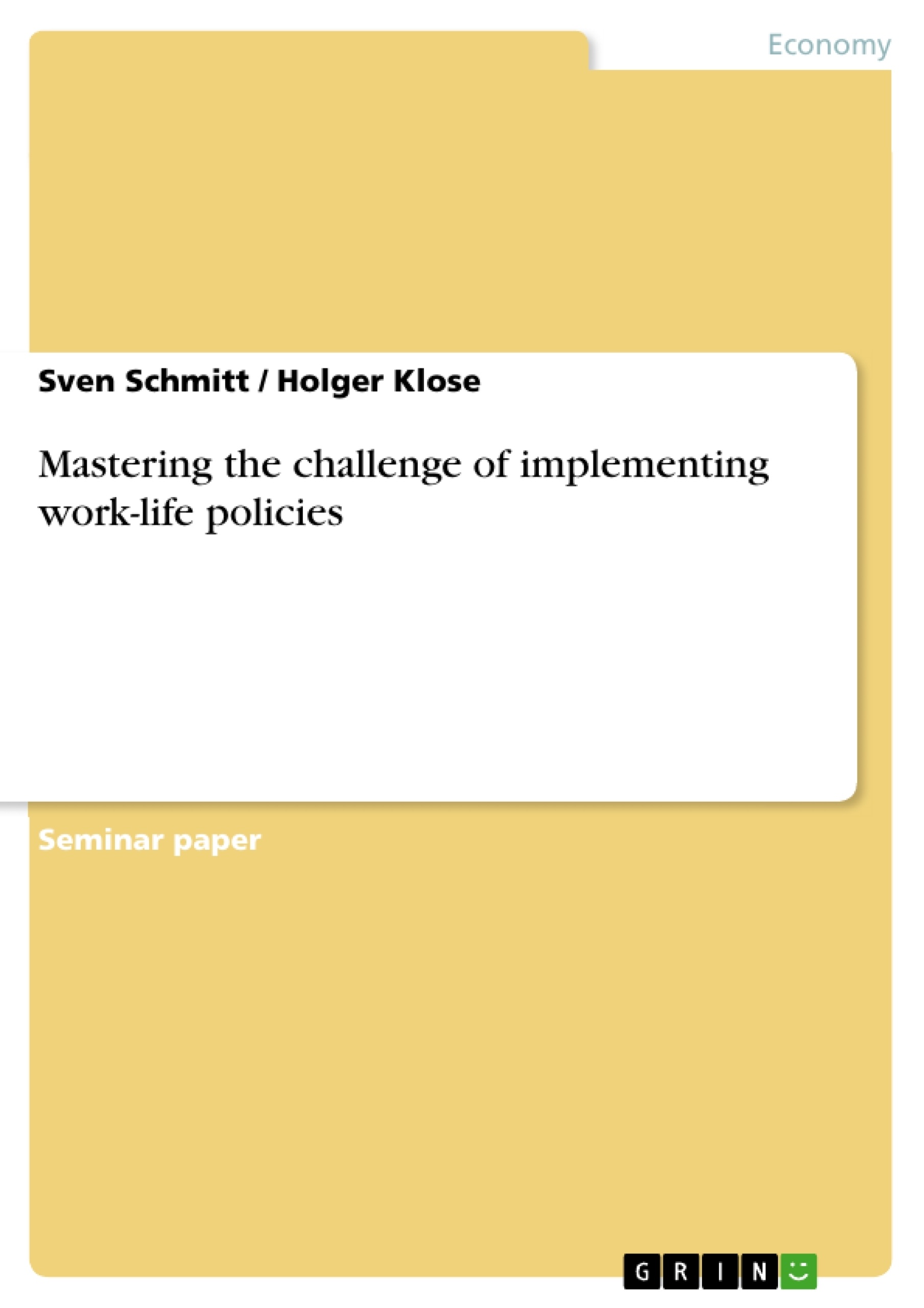Implementing Work Life Balance policies is essential in order to move an organization towards a rising level of acceptance and allowance among both – workforce and management. The implementation is a slow and steady process. It requires commitment, motivation and staying power. While developing a work-life program, the major decisions which have to be made are those dealing with implementation and the individual allowance. As an approach to accomplish this challenging change process, the Family Responsible Company Development Model provides a structured foundation by differing 4 stages a company has to face until reaching its final objective of being an ideal work-life balanced enterprise.
Inhaltsverzeichnis (Table of Contents)
- Management Summary
- Introduction
- The development of WL (Work-Life) -Programs
- Custom development path
- Change Management
- The implementation decision
- Family Responsible Company Development Model - Status of implementation
- Policies
- Practices
- Organizational Culture
- Enablers
- Family Responsible Company Development Model - Status of implementation
- The family responsible company development model
- Stage D
- Stage C
- Stage B
- Stage A
- Examples
- The allowance decision
- What is the allowance decision?
- Risk of unequal treatment
- Factors influencing the allowance decision
- Individual level
- Group level
- Organisational level
- Conclusion
Zielsetzung und Themenschwerpunkte (Objectives and Key Themes)
This handout aims to analyze the implementation and allowance decision process in the context of Work-Life Balance programs. It examines the development path of implementing these programs, highlighting the importance of change management and considering the cultural climate of the organization. The focus is on understanding the Family Responsible Company Development Model and its four stages as a roadmap for achieving a work-life balance within a company.
- Implementation of Work-Life Balance policies as a change process
- Importance of cultural change and commitment for successful implementation
- The Family Responsible Company Development Model as a structured approach
- Factors influencing the individual allowance decision
- The challenges and risks associated with unequal treatment in work-life policies
Zusammenfassung der Kapitel (Chapter Summaries)
- Introduction: This chapter introduces the four key decisions involved in implementing Work-Life Balance programs: adoption, design, organizational implementation, and individual allowance decision. The handout focuses on the latter two, exploring the development path and factors influencing implementation. It emphasizes the need for a customized approach based on internal and external factors and the importance of change management.
- The implementation decision: This chapter introduces the Family Responsible Company Development Model (FRCD Model) as a framework for implementing work-life policies. The chapter outlines the four stages of the model, which are defined by policies, practices, organizational culture, and enablers. The FRCD Model aims to provide a structured roadmap for companies to achieve a balanced existence between economic performance and employee well-being.
- The family responsible company development model: This chapter presents the four stages of the FRCD Model in detail. It discusses each stage and provides examples of how companies can implement work-life policies effectively. The chapter aims to show how companies can move from a basic level of implementation to becoming an ideal work-life-balanced enterprise.
- The allowance decision: This chapter explores the challenges of making individual allowance decisions regarding work-life policies. It discusses the potential for unequal treatment and identifies factors that influence these decisions, including individual, group, and organizational levels. The chapter aims to shed light on the complexities of ensuring fair and equitable implementation of work-life policies.
Schlüsselwörter (Keywords)
This handout focuses on the implementation and allowance decisions related to Work-Life Balance programs. Key concepts explored include change management, cultural change, organizational development, the Family Responsible Company Development Model, work-life balance policies, individual allowance decisions, and the challenges of ensuring equitable and fair treatment within the context of these programs.
Frequently Asked Questions
What is the 'Family Responsible Company Development Model'?
It is a structured framework consisting of four stages (A to D) that guides companies toward becoming an ideal work-life balanced enterprise.
Why is implementation of work-life policies considered a slow process?
It requires a deep cultural change within the organization, sustained commitment from management, and high levels of acceptance among the workforce.
What is the 'allowance decision' in work-life programs?
The allowance decision refers to the individual determination of which employees are granted access to specific work-life benefits, such as flexible hours or remote work.
What risks are associated with individual allowance decisions?
There is a significant risk of perceived or actual unequal treatment, which can lead to resentment or decreased morale if not handled transparently.
Which factors influence the decision to grant work-life benefits?
Factors at the individual level (performance), group level (team requirements), and organizational level (company culture and policies) all play a role.
- Citation du texte
- Sven Schmitt (Auteur), Holger Klose (Auteur), 2008, Mastering the challenge of implementing work-life policies, Munich, GRIN Verlag, https://www.grin.com/document/141086



